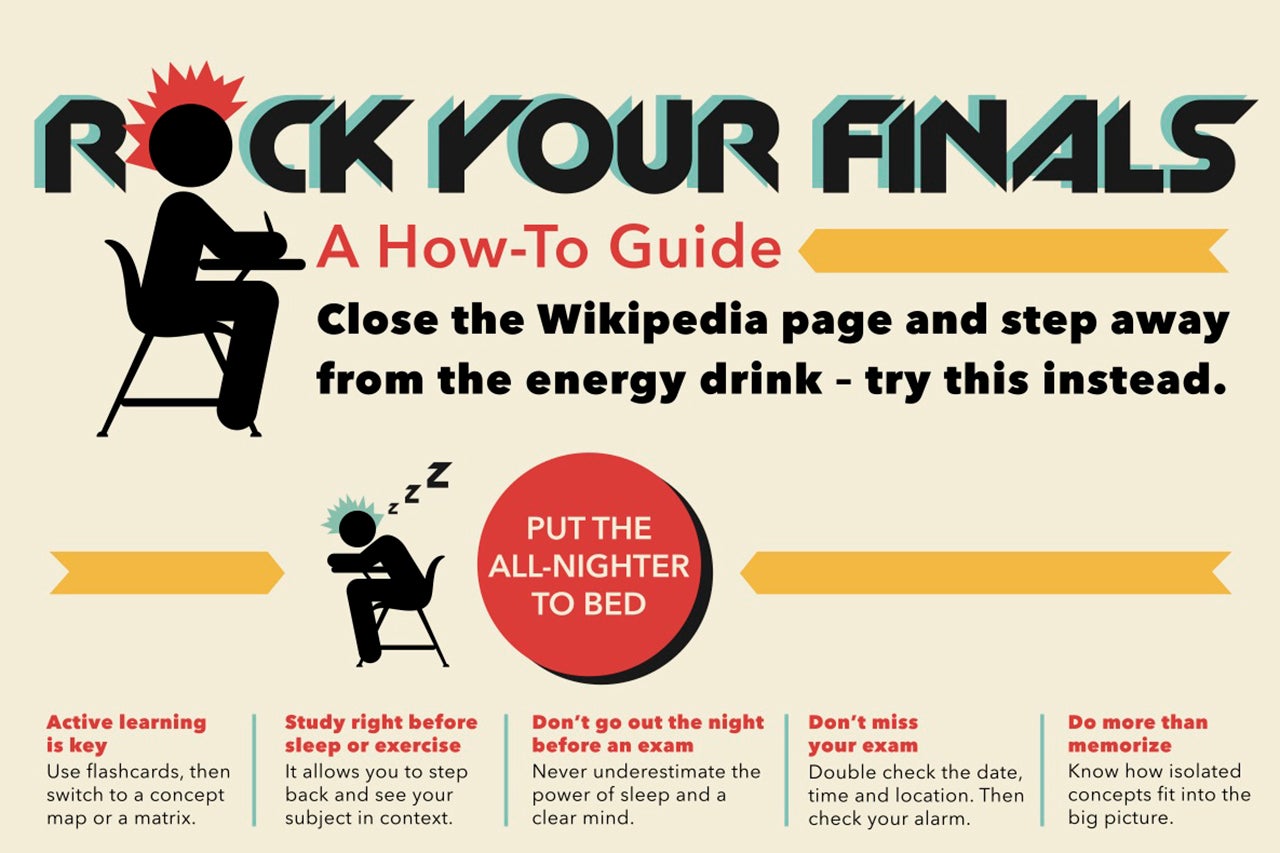Close the Wikipedia page and step away from the energy drink – try these tried-and-true tips instead.
Welcome to fall finals! If you’ve gotten this far – whether you’re approaching your first or your eighth finals week – you’ve probably heard a lot of don’ts: Don’t wait until the night before an exam to start studying, don’t pull an all-nighter, don’t go out to bars before a big exam, and so on. Well the College of Charleston Center for Student Learning (CSL) would like to share a few important do’s (and a few equally important don’ts) you probably haven’t heard before:
1. Map your study guide
This is called active learning – basically it’s a method of studying that goes beyond memorizing flashcards or re-reading textbooks, as your brain can quickly tune out complex information when its presented in such an intimidatingly large package. Instead, try to physically separate concepts and then draw lines illustrating how they connect to one another.
2. Study before bed, or before hitting the gym
Being able to put down your materials and focus on something else – sleeping, a run, even a short walk – lets you see your subject in its greater context and make connections you can’t see when you’re hyper-focused on one theory or concept.
3. Don’t go out the night before an exam
Yep, this one again. It’s an important tip because so many students make this mistake. Not only can going out to a party or a bar impair your judgment as far as necessary study time, it can also leave you sleep deprived before your big exam.
4. Don’t miss the exam
It may seem obvious, but finals schedules can be complicated, especially when combined with the stress of studying and preparing to travel for winter break. Write down your exam schedule in a planner or on post-it notes – writing it out will help you remember and you’ll have the hard copy to refer to. Oh, and don’t forget to set an alarm!
5. Understand the big picture
Successful active learning requires that you stop simply memorizing; for instance, knowing which artists painted which works might be a huge part of your art history exam, but so is knowing which movements those artists belong to, and how one movement influenced the next.
6. Master the art of the study group
Limit study groups to only four or five people for the most productive study sessions. Then assign tasks to each member – things like chapter summaries or flash cards – to weed out classmates who may not be as serious about the material.
7. Administer self-tests
By the time finals roll around, you should be aware of how your professor will test you. So test yourself first – refer to old tests to compose questions, then answer them. If you start earlier enough, you’ll be able to ask your professor about any self-test questions you missed.
8. Library or coffee shop?
Will you be distracted by throngs of people bustling in and out of the library during finals week? Or do you need complete silence to study – in other words, will the indie music and coffee-shop hum drive you nuts? Find your ideal study space, there are plenty of quiet corners on campus and even more around town.
9. Don’t cram!
OK, we know you will probably cram for some exams (try not to!) so at least know the ones that are hardest to cram for. These cumulative subjects are about impossible to master in only a day or two: Math, foreign languages, psychology, accounting, economics and sciences.
10. Ask for help when you need it
Not only can your professors serve as an excellent resource, but the CSL also helps many-a-student throughout the year. 45 percent of students visit the CSL over roughly 32,000 visits to work on 130 courses in an academic year. There’s a good chance that a tutor, peer-academic coach or supplemental instruction leader can help you, too!
For any additional questions or to set up a tutoring appointment, visit the Center for Student Learning website. The Center for Student Learning provides comprehensive academic support programs for College of Charleston students as they strive for excellence in learning, while promoting student leadership and development through peer education experiences.
For more information, contact Melissa Thomas at [email protected].




